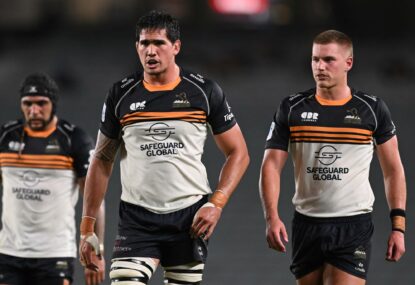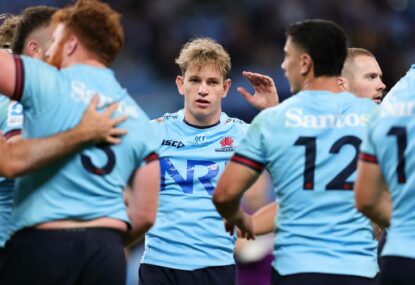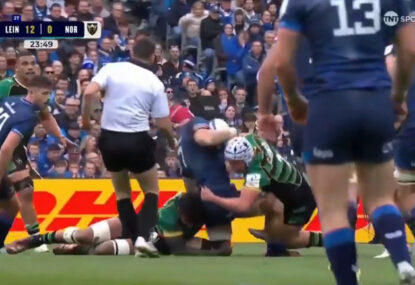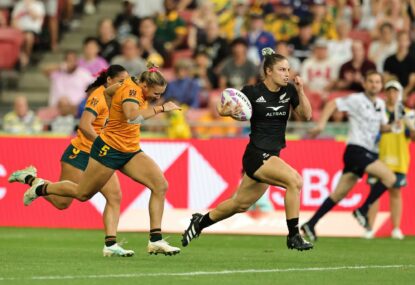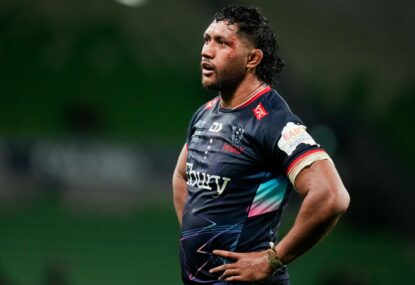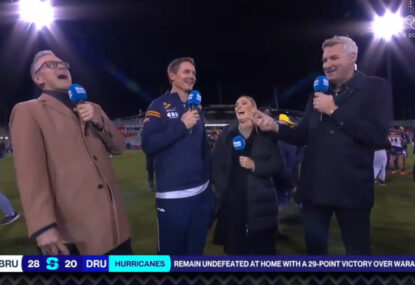Steve Walsh has been refereeing since he was 16, and has again reached the pinnacle with his selection as the referee for the 2012 Super Rugby Final, his second such appointment after overseeing the Super 14 Final in 2007 between the Bulls and Sharks.
“It hasn’t really sunk in, but obviously I am pleased, you always want to be recognised for strong performances,” Walsh said.
“I suppose it is always nice that people appreciate the work you put out there.”
Walsh said that the trick to his improvement this year was similar to lessons he used in life.
“It is continuous work figuring out what your strengths and weaknesses are and working on those, and for me especially it has been like that for the last couple of years,” he said.
“Last year for me was disrupted with injury, but this season it has been more about me, not the teams or game, but more focusing on my mental preparation prior to each match. I deal with how I am feeling and what I am trying to achieve during the games.”
Walsh said of equal importance wasn’t just what happened on the field, but ensuring that he assessed his game post match.
“I do a review of my performance, work out what I did wrong and try and improve on my faults from a game-to-game basis,” he said,
“I think all of us (the referees) like to think we are our own toughest critics.”
Walsh is a popular referee with the players, with his approach in regard to dealing with 30 men on the park focused on man management, without becoming too heavy handed.
“The sort of things I am strong on is emotional control and empathy with players, and be self-aware, that is creating the space I need to work while officiating the game,” he said.
“(But) every referee needs to be in charge, because at the end of the day, we are responsible.”
“I think the art of refereeing is the art of managing men, just going out there and acting like a dictator won’t end up with a successful result for all. It is about getting men to do what you want them to do, but not coming down on them like a schoolteacher by being too strict demanding ‘this is the way it has to be’.”
Despite focusing on the approach, any referee is still going to be questioned, and Walsh felt that part of the process was giving a player the attention first, making sure that he only dismissed their view if he felt there was no valid point to be made.
“I think at the start you need to listen to players, and this is one of the things I am really trying to do, because you can then assess if they have validity in what they are trying to say,” Walsh said.
“If they don’t, you can move on from that, but if they have a point, then I listen and acknowledge, and then take a course of action.”
“I think I have the ability to put a line in the sand and tell them fairly if I disagree with them.”
With the Chiefs and Sharks working furiously behind the scenes with their match analysis, Walsh said at this stage of the campaign he didn’t need to examine the teams in too much detail.
“At the beginning of the year yes, and looking back at what has happened throughout the season, I’ve done a lot of video review of teams, myself, and other referees,” Walsh said.
“Now that the season is progressing, I have a firm picture of what I want to see, and what is not acceptable, and I am at the stage that I have control.”
“In this game I’m not worried about the teams, I know what is expected.”
“My gut feeling, having seen the teams, as well as refereeing the Sharks last week, is that both teams have good intent, and it makes it a lot easier as there isn’t negativity out there.”
Walsh, like most referees, believed that rugby’s key priorities centred around the tackle and ruck area, and the Super Rugby Final whistle blower said the key wasn’t only the contest, but ensuring quick ball for a good spectacle.
“The tackle area is always something that referees have a continuous work on with, as we want to create quick ball,” he said.
“Obviously physically dominant teams or players going forward are going to get that quick ball, giving them a better platform to work off, so the breakdown is one of our key areas.”
However Walsh said he had also put special focus into his management of scrums this season.
“I’m also aware that you need to have a good scrum night, because if the scrums don’t go well, often you don’t have a good game of rugby,” he said.
“Setting up the set phases and giving the teams a good platform where they can create quick ball is what we are all after.”
Walsh was quite clear with what was needed to operate a good scrum.
“The teams, and myself, need strong management at setup,” he said.
“There are the four calls (crouch, touch, pause, engage) followed by four actions by the team. My triggers are a) is the height right at setup (pre-engagement) b) head and shoulders above hips (post-engagement) and c) spines in line (post-engagement).”
While watching for this accuracy, Walsh also said he looked carefully for illegal tactics.
“Every referee puts a huge amount of focus and time on making sure the scrums are right, and ploys like deliberate or quick wheels, are pretty easy to spot due to the speed with which it happens,” he said.
“If a team is trying to fox you at the engage, it is important not to move on, and then reset and continue with my four call process. If they don’t change, then penalties need to apply.”
“Post engagement, I want to be clear about the pictures that are in front of me so I can accurately label what is acceptable and what is not.”
The Super Rugby Final would also be policed like any other match, with Walsh making it quite clear there would be no alteration to his game for such a big occasion.
“No change,” Walsh said.
“Player attitude will dictate the game. We all hope that I can set the game and we are away, and give the players your understanding of what is acceptable, so they can make the play. If player attitude isn’t right, then you need to be fair to the other team, but for the Super Rugby Final, I’m not concerned about this as the Chiefs and Sharks are positive teams.”
Walsh, like all within the rugby community, has a vision of how the game should be played, but also knows he has to do what was required.
“We would all love it to be an open, flowing, entertaining and enthralling match,” Walsh said.
“But I am also prepared to knuckle down if I need to, if it is a grind it is a grind, I can only work with what the teams put in front of me.”
– provided by SANZAR





























































































